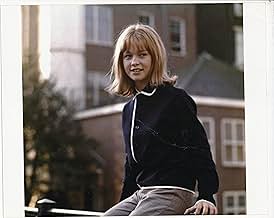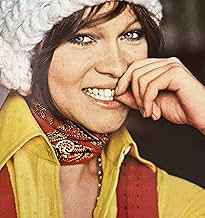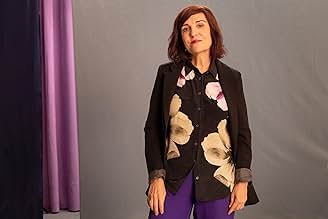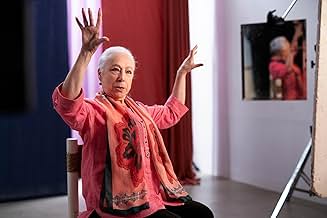Documentary on the life of iconic Spanish recording/model/film super-star, Marisol. Her career as Pepa Flores was restarted once she broke free from her perceived "child star" Franco era ima... Read allDocumentary on the life of iconic Spanish recording/model/film super-star, Marisol. Her career as Pepa Flores was restarted once she broke free from her perceived "child star" Franco era image.Documentary on the life of iconic Spanish recording/model/film super-star, Marisol. Her career as Pepa Flores was restarted once she broke free from her perceived "child star" Franco era image.
- Awards
- 1 win & 2 nominations
- Director
- Writer
- All cast & crew
- Production, box office & more at IMDbPro
Storyline
Did you know
- ConnectionsReferences The Days of the Past (1977)
Featured review
A documentary that describes Marisol and Pepa Flores like never before. Documentary on the life of iconic Spanish singer/model/film super-star, Marisol. Her career as Pepa Flores was restarted once she broke free from her perceived "child star" Franco era image. Through women who feel represented by the artist, we discover Pepa Flores, who has remained hidden in the shadow of the figure of Marisol. Everyone knows Marisol, but few know Pepa Flores, a woman who decided to turn off the spotlight of fame in 1985, when she was only 37 years old. Until then, her image was a constant on the screens, on the covers of magazines, an overexposure that together with her sudden de-attraction from show-business turned her into a myth. The documentary analyses her impact on society from becoming an image promoted, exemplified and idolized by Francoism to becoming a figure also directed by her then husband, as an unwavering follower of communism and Trotskyism, and participant in all the ultra-leftist parties that were common at the time.
In order to tell us who Pepa Flores was and analyse her impact on society, the documentary uses unpublished archive material and interviews with people close to the actress. Like her sister Vicky Flores, the dancer Cristina Hoyos, producer Enrique Cerezo, director Fernando Méndez-Leite to politicians like Esperanza Aguirre, Cristina Almeida and to interviews with people who have been influenced by her, such as the writer Elvira Lindo or the singer Amaia.
¨Marisol, llámame Pepa¨(2024) also made a broad review of her life, which in summary is as follows: Marisol was an appealing Spanish actress and singer . Spanish film studios were looking for a new child star to follow the steps of Pablito Calvo, and make popular and populist folkloric movies and they found Marisol . She was discovered by her future producer Manuel J. Goyanes in an exhibition of the "Coros y Danzas de Málaga" in TVE in 1959 . Being famous as the perky, cheerful girl who had a big hit in Spanish cinema. She even had some success in the USA where she was interviewed on the Ed Sullivan show, Mariol was a true ambassador of the dictatorial regime, received by Franco himself at the Palacio de la Granja, and at the time all the girls wanted to be Marisol. Her debut in cinema was in 1960 and she complemented her activity in cinema with records , recitals and TV-shows . Most of them were produced by Manuel J Goyanes , in fact , she was introduced to the movie business and discovered by this powerful producer in ¨Un Rayo De Luz¨ (1960) by Luis Lucia , who directed her in this first feature , where earned his famous name . A big hit was¨Tómbola¨ being especially known the song: ¨Mi vida es una Tómbola de luz y de color ¨ composed by Antonio Guijarro , and Augusto Algueró that's heard in the documentary. Marisol was widely known in Spain when she became a widely successful child star , following ¨Ha LLegado Un Angel¨, ¨Marisol Rumbo a Rio¨ which were big box-office hits in Spain during Franco's dictatorship , and she became Spain's most famous girl actress , outstanding his highly expressive face and eyes , charming eyes and innocent , angelical face . She was a milestone in Spanish "child prodigies" under Franco along with Joselito , Pili and Mili , Ana Belén and especially Pablito Calvo . And the producers trying to keep them as little kids for as long as possible . Due to false advertising by the studios that made their movies, and which wanted to make them appear younger than they really were , an obsession that haunted them through the whole of their careers . After the national and international hits as ¨La Nueva Cenicienta¨ , ¨La Historia De Bienvenido¨ and ¨Cabriola¨, and following other successful films as ¨4 Bodas Marisol¨, ¨Carola De Dia , Carola De Noche¨ . In some films Marisol was already a teenager, and looked more like a young woman than like a little girl . So, the producers decided to compress her breasts with a bandage under her clothes to make her look younger . In her films she often sings Flamenco Cante , Saetas , Soleadas , Bulerias , Habaneras and other Folkloric songs . After several movies and records , and already a big star as a singer and an actress in Europe, the next move was trying to triumph in America, there she also played , sang and danced to grant local box-office . His success even reached around the world . However, life was not too glamorous for Marisol, as she was treated almost as a sideshow act by his managers , not allowing him to become an ordinary teenager . She was forced to keep his childlike image up to the seventies ; however , thanks to Juán Antonio Bardém changed his acting style , playing thrillers as ¨La Corrupción de Chris Miller¨ and ¨Poder Del Deseo¨ , and subsequently directed by prestigious filmmakers as Carlos Saura in ¨Carmen¨ , ¨Bodas de Sangre¨ and Mario Camus¨ in ¨Dias Del Pasado¨. Her last movies were the notorious TV series ¨Proceso a Mariana Pineda¨ and the last one: ¨Caso Cerrado¨ and she was not successful anymore . Marisol married two times , to Carlos Goyanes and Antonio Gades . Fidel Castro was the best man at her wedding to Antonio Gades . She has three daughters from her marriage to Antonio Gades , on of them the known actress Maria Esteve . Disappearing from public life in 1985, when she was still high in her career, she left everything , returned to her homeland, Malaga, and has lived as a housewife since then for her own choice . Has received many invitations to return, but has declined all of them, even simple interviews on TV. Retired In Malaga from acting at early age to become a discreet person and was then discovered much later that she had become a housewife and is now a social and humanitarian activist. Finally she received an Honorary Goya Award collected by her three excited daughters, but Marisol, following her fundamental principles, in which she insisted that she never again wanted to appear in public, did not come to the emotional ceremony, and her absence was greatly missed.
In order to tell us who Pepa Flores was and analyse her impact on society, the documentary uses unpublished archive material and interviews with people close to the actress. Like her sister Vicky Flores, the dancer Cristina Hoyos, producer Enrique Cerezo, director Fernando Méndez-Leite to politicians like Esperanza Aguirre, Cristina Almeida and to interviews with people who have been influenced by her, such as the writer Elvira Lindo or the singer Amaia.
¨Marisol, llámame Pepa¨(2024) also made a broad review of her life, which in summary is as follows: Marisol was an appealing Spanish actress and singer . Spanish film studios were looking for a new child star to follow the steps of Pablito Calvo, and make popular and populist folkloric movies and they found Marisol . She was discovered by her future producer Manuel J. Goyanes in an exhibition of the "Coros y Danzas de Málaga" in TVE in 1959 . Being famous as the perky, cheerful girl who had a big hit in Spanish cinema. She even had some success in the USA where she was interviewed on the Ed Sullivan show, Mariol was a true ambassador of the dictatorial regime, received by Franco himself at the Palacio de la Granja, and at the time all the girls wanted to be Marisol. Her debut in cinema was in 1960 and she complemented her activity in cinema with records , recitals and TV-shows . Most of them were produced by Manuel J Goyanes , in fact , she was introduced to the movie business and discovered by this powerful producer in ¨Un Rayo De Luz¨ (1960) by Luis Lucia , who directed her in this first feature , where earned his famous name . A big hit was¨Tómbola¨ being especially known the song: ¨Mi vida es una Tómbola de luz y de color ¨ composed by Antonio Guijarro , and Augusto Algueró that's heard in the documentary. Marisol was widely known in Spain when she became a widely successful child star , following ¨Ha LLegado Un Angel¨, ¨Marisol Rumbo a Rio¨ which were big box-office hits in Spain during Franco's dictatorship , and she became Spain's most famous girl actress , outstanding his highly expressive face and eyes , charming eyes and innocent , angelical face . She was a milestone in Spanish "child prodigies" under Franco along with Joselito , Pili and Mili , Ana Belén and especially Pablito Calvo . And the producers trying to keep them as little kids for as long as possible . Due to false advertising by the studios that made their movies, and which wanted to make them appear younger than they really were , an obsession that haunted them through the whole of their careers . After the national and international hits as ¨La Nueva Cenicienta¨ , ¨La Historia De Bienvenido¨ and ¨Cabriola¨, and following other successful films as ¨4 Bodas Marisol¨, ¨Carola De Dia , Carola De Noche¨ . In some films Marisol was already a teenager, and looked more like a young woman than like a little girl . So, the producers decided to compress her breasts with a bandage under her clothes to make her look younger . In her films she often sings Flamenco Cante , Saetas , Soleadas , Bulerias , Habaneras and other Folkloric songs . After several movies and records , and already a big star as a singer and an actress in Europe, the next move was trying to triumph in America, there she also played , sang and danced to grant local box-office . His success even reached around the world . However, life was not too glamorous for Marisol, as she was treated almost as a sideshow act by his managers , not allowing him to become an ordinary teenager . She was forced to keep his childlike image up to the seventies ; however , thanks to Juán Antonio Bardém changed his acting style , playing thrillers as ¨La Corrupción de Chris Miller¨ and ¨Poder Del Deseo¨ , and subsequently directed by prestigious filmmakers as Carlos Saura in ¨Carmen¨ , ¨Bodas de Sangre¨ and Mario Camus¨ in ¨Dias Del Pasado¨. Her last movies were the notorious TV series ¨Proceso a Mariana Pineda¨ and the last one: ¨Caso Cerrado¨ and she was not successful anymore . Marisol married two times , to Carlos Goyanes and Antonio Gades . Fidel Castro was the best man at her wedding to Antonio Gades . She has three daughters from her marriage to Antonio Gades , on of them the known actress Maria Esteve . Disappearing from public life in 1985, when she was still high in her career, she left everything , returned to her homeland, Malaga, and has lived as a housewife since then for her own choice . Has received many invitations to return, but has declined all of them, even simple interviews on TV. Retired In Malaga from acting at early age to become a discreet person and was then discovered much later that she had become a housewife and is now a social and humanitarian activist. Finally she received an Honorary Goya Award collected by her three excited daughters, but Marisol, following her fundamental principles, in which she insisted that she never again wanted to appear in public, did not come to the emotional ceremony, and her absence was greatly missed.
Details
Box office
- Gross worldwide
- $14,310
- Runtime1 hour 27 minutes
- Color
Contribute to this page
Suggest an edit or add missing content

Top Gap
By what name was Marisol, llámame Pepa (2024) officially released in Canada in English?
Answer






















